- Home
- Robert Hellenga
Love, Death & Rare Books
Love, Death & Rare Books Read online
Also by Robert Hellenga
The Sixteen Pleasures
The Fall of a Sparrow
Blues Lessons
The Italian Lover
Philosophy Made Simple
Snakewoman of Little Egypt
The Confessions of Frances Godwin
The Truth about Death: And Other Stories
Love, Death & Rare Books
Robert Hellenga
To the Memory of Robin Metz,
who inspired us all
1942—2018
At Least
I want to get up early one more morning,
before sunrise. Before the birds, even.
I want to throw cold water on my face
and be at my work table
when the sky lightens and smoke
begins to rise from the chimneys
of the other houses.
I want to see the waves break
on this rocky beach, not just hear them
break as I did all night in my sleep.
I want to see again the ships
that pass through the Strait from every
seafaring country in the world—
old, dirty freighters just barely moving along,
and the swift new cargo vessels
painted every color under the sun
that cut the water as they pass.
I want to keep an eye out for them.
And for the little boat that plies
the water between the ships
and the pilot station near the lighthouse.
I want to see them take a man off the ship
and put another up on board.
I want to spend the day watching this happen
and reach my own conclusions.
I hate to seem greedy—I have so much
to be thankful for already.
But I want to get up early one more morning, at least.
And go to my place with some coffee and wait.
Just wait, to see what’s going to happen.
—Raymond Carver
Part One: Chas. Johnson & Son, Ltd., Antiquarian Booksellers
I. THE FUR COAT
(1970–1971)
My grandfather and my father ran an old-fashioned bookshop on Fifty-Seventh Street in Hyde Park—CHAS. JOHNSON & SON, LTD. ANTIQUARIAN BOOKSELLERS—not far from the University of Chicago. At the time I started “working” in the shop in the seventies, at age twelve, we stocked about fifteen thousand rare books on the second floor and about two hundred thousand used books on floors one, three, and four; so you won’t be surprised to learn that most of our family stories were about books: books that Grandpa Chaz brought with him from New York’s book row when he came to Chicago in 1931; books from the Bruneau estate on the North Shore that gave Grandpa Chaz a leg up during the Depression; books that Grandpa Chaz and Dad bought at estate sales in the forties, after the war, probably the best time in history to buy rare books; books bought for $5 and sold for $10, later bought back for $100 and sold at auction, after another ten or fifteen years, for $1,000; books that got away and books that we couldn’t get rid of.
But the story that sticks in my imagination is not about a book; it’s about a fur coat. Not the raccoon coat in the front of the shop that Saul Bellow used to admire, the coat that Grandpa Chaz had stolen from Harry Gold—the man who engineered the theft of Edgar Allan Poe’s Al-Aaraaf from the Reserve Book Room in the New York Public Library. It’s about Mamma’s fur coat.
But it’s about a book too.
It’s shortly after Christmas, five months before Mamma disappears. The tree is still up; I can smell it in my bedroom, where I sleep with our dog, Punch—short for Pulcinella—a stray dog that Mamma brought home one day. Mamma comes up to say good night. She stands in the doorway for a few minutes while we talk, and when she leaves, she says, “Beh, ce l’abbiamo fatta, sani e salvi.” Well, we made it through, safe and sound. Mamma was Italian and always spoke Italian to me when we were alone, and sometimes when we weren’t.
But I think maybe we haven’t made it through safe and sound, because after Grandpa Chaz goes to bed, I hear Mamma and Dad, who’ve been doing some drinking, arguing about something in the kitchen. I wrap my book around my thumb—my favorite Hardy Boys mystery, Hunting for Hidden Gold—and listen at the top of the stairs.
I’m trying to figure out what’s happening. Mamma wanted a fur coat for Christmas but she’d gotten a rare book instead—a first edition of an Italian translation of Montaigne.
“Why would I want to read Montaigne?” she says.
“It’s in Italian. I thought you’d like it.”
Dad says more, but I can’t make out the words. Then I hear Mamma say, “I want to live life, not read about it.”
After a mysterious silence, Dad says—his voice different, lower—that he’ll buy her a fur coat if she’ll run around the house outside, stark naked, three times.
“Deal,” Mamma says, laughing, “I’ll do it.” When Dad starts to protest, to say he’s only kidding and that it’s too cold to run around outside naked, Mamma won’t hear of it. She’s made up her mind. She wants a fur coat.
Ice cubes rattle in the sink, and then Dad comes up the stairs. I get into bed and pretend to be asleep. He comes over to my bed, turns off the light, then stands there for a moment. After he and Punch are back downstairs, I go to my window. From my dormer I can look out at the houses across the street, at the lighted Christmas decorations in the front yards and the flicker of televisions in the downstairs windows. I don’t understand what’s going on. I’m embarrassed. But I’m excited too. No other mother on our block will be running outside naked in six inches of snow. I can hear them laughing. Then the kitchen door opens and closes.
About thirty seconds later I see her, down below me. She’s going counterclockwise, lifting her knees in the deep snow and hugging herself, covering her breasts. She’s white as snow, beautiful as an angel. But naked. I try to look away, but I can’t. Another two minutes and I see her again and watch her disappear, and I know she’s running through the narrow space between our house and the Harringtons’, which Grandpa Chaz calls a “ginnel.”
Mamma appears a third time, a ghostly figure suddenly emerging into the light and disappearing again, and then I hear her pounding on the back door and Punch barking and Dad shouting, “Who is it? What do you want?” before finally opening the door and letting her in.
I run downstairs. Dad has wrapped Mamma’s robe around her and is holding her in his arms. Both of them are laughing and I start laughing too, and we all drink a glass of prosecco and something called crème de cassis.
Two days later we go to McElroy’s in Winnetka. It’s a sunny winter morning and we drive along the lake all the way. The sky is blue, the lake blue-green. DuSable Harbor is empty, but the water intake just beyond the breakwater looks like a giant rowboat.
I know from the way the salesman greets us at McElroy’s that Dad has already spoken to him. The salesman brings a coat out of a climate-controlled vault and Dad nods. Mamma tries it on, but then she asks to see a different coat. She keeps asking to see more coats until she finds what she wants: mink (I’m too young at the time to disapprove), black, full length, and sheared. The salesman holds it up and Mamma steps into it and walks up and down, admiring herself in various mirrors.
The coat is beautiful, but it isn’t a magic coat, and it doesn’t keep Mamma and Dad from sitting up late, drinking and talking softly. I listen as hard as I can, but I can’t make out what they’re talking about. I sit at the top of the stairs or at the cold air register till I h
ear the clatter of ice cubes in the sink, and then I get back into bed.
Mamma wears the coat all winter, wears it to the grocery store, wears it when we go with Dad and Grandpa Chaz to Maxwell Street, on a Sunday morning, where we eat Polish sausage sandwiches and listen to the Mississippi Blues Band, and Mamma gets her fortune told by a gypsy on the corner of Maxwell and Halsted. She wears it when she walks me to school with Punch on his leash. She wears it to my birthday party in April, when all the other mothers are in lightweight linen jackets or windbreakers.
But she doesn’t take the coat with her when she disappears in May.
The morning she disappears is like most mornings. She poaches eggs for us, and then Dad and Grandpa Chaz leave for the shop. I drink a glass of milk with a little coffee in it, and then we walk to school. It’s May but chilly—Mamma is in her fur coat, of course, and I’m in my Cubs sweatshirt. Thin clouds hang high in the sky, like hooks or tufts of hair. As we approach the corner of Blackstone and Fifty-Eighth Street, Mamma shouts, Ci stiamo avvicinando all’angolo della cacca numero uno—We’re approaching Poop Corner Number One—and we stop to give Punch a chance to do his business.
I’m twelve years old, just finishing my last year at William H. Rey Elementary, so when she puts her arms around me in front of the gate, I’m embarrassed. And that day it’s worse because I can see she’s crying. “Mi trovo un po’ in difficoltà,” she says. I'm in trouble. But instead of listening, I run off to join my schoolmates, who are crowding around the front door.
When Dad and I come home from the shop that night, she’s not there. There’s no note. Punch is in the backyard. Grandpa Chaz is taking a nap. Her car isn’t in the garage. When she doesn’t come home for supper, Dad calls Mrs. Ogilvie, who owns the cabin—the Loft—in St. Anne, Michigan, where we vacation every summer, but she isn’t there either. Dad doesn’t do anything else the first night—she’s disappeared before—but when Mamma doesn’t come home by morning, he calls the police. The police won’t declare her missing for a week. She’s an adult and there’s no sign of foul play. By then Dad has telephoned all of her friends and hired a private detective. But two weeks after she disappears, a letter comes to the shop. Mamma has fallen love with another man, Dad tells me as we walk home together. She’s gone to live with him in Rome.
“Do you know who it is?” I ask.
“I have a pretty good idea,” he says.
Mi trovo un po’ in difficoltà, she’d said to me the last time she walked me to school. I want to tell Dad, but I think that he’s in a little difficulty too, and I don’t want to make things worse.
A few minutes later, as we turn onto Blackstone, Dad says, “She wants to live life, not read about it.”
Dad doesn’t show me the letter, but I have one of my own waiting in the mailbox when we get home. Dad goes to his room, and I go to mine. We both need to be alone. She’s sorry, she says in her letter, molto spiacente—she loves me and she hopes I will forgive her. I crumple up the letter till it’s the size of a Ping-Pong ball and throw it into the wastebasket. I get my bike out of the garage and pedal down Fifty-Seventh Street, under Lake Shore Drive, and out to the Point, and sit on the big rocks and throw stones into the lake until I can’t see them hit the water anymore.
When I get back home, Dad and Grandpa Chaz have already eaten. Dad offers to fry me a hamburger, but I’m not hungry.
“What the hell is the matter with that woman?” Grandpa Chaz says, setting his glass of bourbon on the kitchen table and struggling to get out of his chair. He’s a little unsteady. “You buy her a goddamn fur coat,” he says, “and the next thing you know, she leaves us high and dry.”
In August, Dad and Grandpa Chaz and I go to the Loft in St. Anne for three weeks and I take sailing lessons. In September, I start seventh grade at the Lab School—Latin, earth science, American history, English, algebra. After school, I go straight to the shop and take Punch for a walk. Amos, our third-floor manager, takes him out at noon, but he spends most of the day in Dad’s office. I do my homework at the library table on the second floor. At six o’clock or so, Dad and Grandpa Chaz and I walk home with Punch. I always listen for Mamma’s voice as we enter the empty house, and Punch runs through all fifteen rooms looking for her.
On Christmas Eve, Dad and I go to the four o’clock service in Rockefeller Chapel, and afterward we skate on the Midway. It feels good to glide with him on the ice as it gets dark, and then sit together in the warming house.
Does he expect something to happen? Does he think, or hope, as I do, that Mamma might come back for Christmas? They’ve been divorced since Thanksgiving in the United States, but Dad says he and Mamma are probably still married in Italy, because Italy won’t recognize an American divorce.
I had swallowed my anger and answered Mamma’s letter—which I’d retrieved from the wastebasket—begging her to come home. Dad and I don’t talk about the possibility. We’re afraid to jinx it.
I help make dinner that night while Grandpa Chaz sits at the kitchen table drinking bourbon. We boil some small potatoes and make a salad. I set the table in the dining room while Dad sautés three small steaks. Dad opens a bottle of red wine and we sit down to eat. We don’t talk much. I think we’re all waiting for something to happen. Afterward we sit in the living room and wait some more. The tree looks nice, but it doesn’t have Mamma’s touches. Dad sits in his chair with his eyes closed, a book on his lap, while I wrap a couple of presents at the glass coffee table and fill out the tags. I haven’t wrapped any presents for Mamma, but I have a couple of things in reserve, just in case—some earrings and a small leather wallet. I assume Dad does too.
“High and dry,” Grandpa Chaz said. “I’m going up to bed.”
Dad opens his eyes and picks up his book again. We read in front of the fire for another half hour, and then Dad unplugs the tree and says good night. I’m halfway through a boy’s version of Sir Gawain and the Green Knight, which I’ve read before. The Christmas festivities are over and Gawain is about to set out on his quest to confront the mysterious Green Knight. I try to imagine him in his gleaming, golden-bright armor, but I get lost in my fantasy and keep picturing him in Mamma’s fur coat. I close the book, and then my eyes. But I don’t fall asleep. I’m waiting, as if for Santa Claus—or Babbo Natale, as Mamma called him—and watching the shadows from the last embers move along the ceiling. After a while I go upstairs. I take Mamma’s coat out of her closet, still in its protective garment bag, and drag it down the stairs. I plug in the tree and unzip the bag and pull out the coat and, slip it on. It’s incredibly warm. I turn up the collar. There’s a blue plastic poop sack in one of the pockets.
I turn on a light to keep myself awake, but then I lie down on the couch and after a while I fall asleep. I’m still there, wrapped up in Mamma’s coat, when Dad and Grandpa Chaz come downstairs in the morning. Dad shakes me and says, “Merry Christmas.”
“How much did you pay for that goddamned coat?” Grandpa Chaz asks. “And she didn’t even take it with her.”
“The best money I ever spent,” Dad said. “I don’t want to hear any more about it.” He gets that look he sometimes gets and leaves the room.
At ten o’clock, Dad and I take Punch for a walk. Along the way, Dad points out the site of the old Stineway Drug Shop on Fifty-Seventh and Kenwood. The owner, he tells me, once asked three men to leave because they came in every morning and never ordered anything except coffee, and later the busboy told him he’d just kicked out three Nobel Prize winners.
Back home, Dad puts a precooked turkey from the Co-op in the oven to warm up, and together we peel the potatoes and put them on to boil. We open a can of cranberry relish and put it in a cranberry glass bowl on the dining room table. I set the table and Dad opens a bottle of wine. We take the turkey out of the oven and put in an apple pie, also from the Co-op. There are none of Mamma’s fried artichokes. There’s no pasta. From
my seat I can see Mamma’s fur coat, folded over the back of the couch.
II. FIRST LOVE
(1974)
After Mamma went away, I started walking to the shop with Dad and Grandpa Chaz early in the morning. Punch would go with us, and I’d shout out, Ci stiamo avvicinando all’ angolo della cacca numero uno, and then, depending, numero due. I’d sit in Dad’s office till it was time to walk to school, reading a book or adding up columns of figures on the old Victor adding machine—one that had been “retired”—with two black columns for the cents, three white columns for the tens, and three more black columns for the hundreds—as I waited for the tap tap tap of Miss Sullivan’s flats on the stairs and the smell of her perfume. She and her sister, Estelle, who worked the register at the counter by the front door, wore different perfumes. Equally expensive and equally offensive. Dad kept them both supplied at Christmas and birthdays. They were always carefully made up, eyes dark (greenish blue) with mascara, their hair—already thinning and turning pale—held in place by tortoiseshell combs.
Afternoons Punch and I “worked” the first floor selling children’s books to young readers—readers my own age—and to their mothers. In those days, the first floor was like a conveyor belt. On Tuesday and Thursday afternoons, people could bring their used books to the shop, and Archie Blair, who came from Belfast and spoke with a heavy Ulster accent, would go through them—history and philosophy, religion, literature, science, travel, cookbooks, children’s books—and quote them a price. If the price was acceptable, he’d put them on a cart, and a day or so after they’d been processed, they’d emerge at the front of the shop, where they would wait for buyers for a few days before being shelved.
At six o’clock, we’d walk home. I still listened for Mamma’s voice as we entered the empty house, and Punch continued to run through all fifteen rooms looking for her.
By the time I was fourteen, young adult literature was beginning to emerge as a distinct genre, and I was beginning to feel the pangs of adolescence. Used copies of The Catcher in the Rye and Are You There God? It’s Me, Margaret and Charlie and the Chocolate Factory started showing up in the shop, and I was happy to recommend them. But by the time I turned fifteen, I was looking for something more, which I seemed to find in poetry (Tennyson’s In Memoriam, for example) and in long walks with Alex, with whom I was doing independent reading in Latin; and in long bike rides. We walked the boundaries of Hyde Park (Lake to Cottage Grove). We biked along the lake, sometimes all the way up to Loyola. Alex’s mother was a warm, loving woman, and we sometimes did our homework together in her kitchen, but more often we worked at the shop, at the library table on the third floor, between “Psychology” and “Philosophy.”

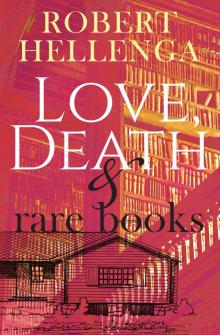 Love, Death & Rare Books
Love, Death & Rare Books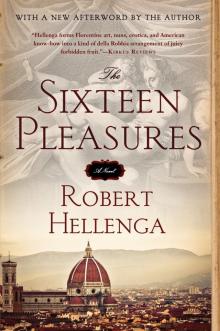 The Sixteen Pleasures
The Sixteen Pleasures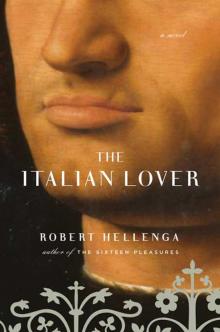 The Italian Lover
The Italian Lover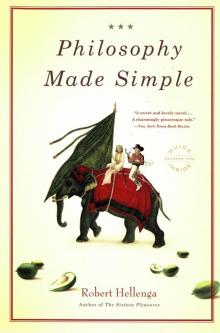 Philosophy Made Simple
Philosophy Made Simple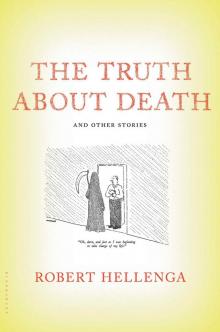 The Truth About Death
The Truth About Death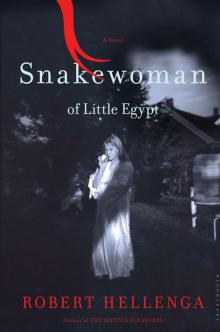 Snakewoman of Little Egypt
Snakewoman of Little Egypt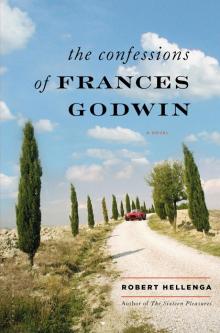 The Confessions of Frances Godwin
The Confessions of Frances Godwin